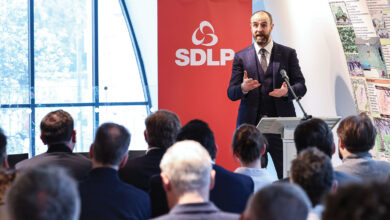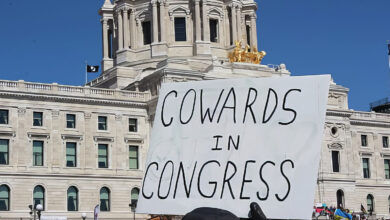TRADE UNION DESK: Picking up the bill

Increased business costs announced by UK Chancellor Rachel Reeves MP are “long overdue”, argues the ICTU’s John O’Farrell.
The new year started with a flurry of cold cheer from large and small companies over increases in the minimum wage and employers’ national insurance announced in October 2024 by the UK Chancellor.
“The British Retail Consortium (BRC) lobby group warned that budget measures mean there is ‘little hope’ of food prices ‘going anywhere but up’ in the second half of 2025,” as one of many, many, news reports said. That wistful chimera ‘confidence’ had been dented, and therefore retailers like Tesco feel compelled to increase prices to offset “£250 million per year”.
After the silly conversation over Labour’s first budget about landlords and shareholders being ‘workers’, the focus has shifted to the ‘fairness’ of raising £40 billion, mostly from businesses, to start to fix the damage committed to the public realm by 14 years of Tory policies.
This is an additional cost for many businesses, there is no denying that. It is also long overdue.
Ten years ago, the then Chancellor Gideon ‘George’ Osborne announced: “Tax cuts for businesses worth over £11 billion per year in 2014-2015: Tax changes coming into effect this week will see the biggest cuts to personal and business taxes for two decades and the most important in a generation.”
Nine years ago, the same figure announced he would “freeze working-age benefits for four years and raise the thresholds at which Britons can access the country’s expensive tax credits system, designed to top up the earnings of those on low incomes.” Those and other welfare cuts amounted to £12 billion. By 2021, £37 billion less was being spent on working-age social security compared with 2010, despite rising prices and living costs, according to estimates produced by the House of Commons Library.
This is as straight forward a transfer of wealth from one class to another as you will ever find. The ‘foundations’ which Osborne used to claim he was buttressing were hollowed out, as brutally revealed during the Covid Inquiry, despite his best attempts to conjure a new reality from base evidence.
As the BMA President, Martin McKee, commented: “For him to say there is ‘no connection whatsoever between austerity and the unequal impact of the pandemic on disadvantaged communities’ is quite staggering. The removal of the social safety net, the cutting and reallocating of public health budgets, the underfunding of public services – all of this had its greatest impact on the most disadvantaged.
“Tens of thousands of excess deaths in the poorest areas were attributed to austerity policies even before the pandemic hit, with ill health among the key causes. Austerity left the poorest exposed to the worst of this catastrophe. In the decade after 2010 life expectancy in the UK hardly improved at all.”
Great incentives
Public services are a great lever for equality. Universal services for everyone, rich and poor, deliver better quality than token handouts for the desperate. Their hollowing-out subsidised corporate welfare. David Cameron’s declared policy was to make the UK “the most open, welcoming, business-friendly country in the world”.
He listed the “great incentives” for businesses to come to the UK in a 2014 document for UK Trade and Investment (UKTI) – a quango helping British businesses succeed abroad and to woo overseas investors. These incentives included the lowest corporation tax rate anywhere in the G7, and tax exemptions for research, energy, fuel, insurance for exporters and direct government support such as that from Invest NI. In addition, we can add direct government procurement for everything to schoolbooks to auditing and such great success stories as PPE procurement during the pandemic and Fujitsu’s Horizon system for the Post Office.
Corporation tax was cut from 28 per cent to an unsustainable 17 percent, and largely reversed by successive chancellor Rishi Sunak MP, necessary to offset the cost of the pandemic and the ongoing slow puncture of Brexit, which “means economic growth will be 4 per cent lower than had the UK stayed in the single market and customs union”.
Tesco’s pre-tax profits in 2024 were £2.3 billion. As a result of policies (and allowances) since 2010, their post-tax profits were quite comfortable. Its CEO, Ken Murphy, “was paid £4.7 million in salary and bonuses in the year to February 2024”.
Even smaller firms should note, before joining the chorus of complaints, that they pay the lowest percentage of wage costs in social contributions of any European country, except Ireland (of course). Even with this 1.2 per cent increase, they remain below the OECD average. They should count their blessings.





